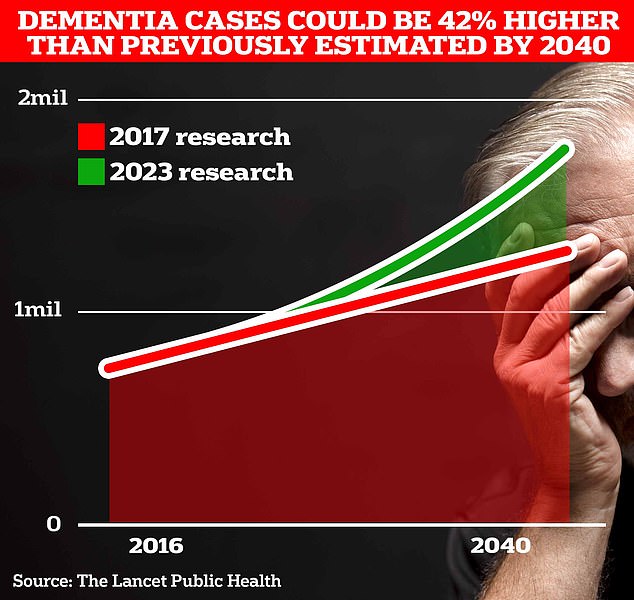With cases of dementia on the rise across the globe, it’s not surprising that many of us are on red alert for signs that we’ve succumbed to the degenerative brain disease.
Dementia is now the UK’s biggest killer, and is an umbrella term for a collection of terminal brain diseases.
Of these, Alzheimer’s disease, which is associated with the abnormal build-up of amyloid and tau proteins in the brain, is the most common.
It accounts for over half—around 60 per cent—of cases, and according to figures released by the Alzheimer’s Society last year, more than a million people are thought to have the condition.
Worryingly, it’s estimated that a third of those currently struggling with dementia are undiagnosed.
There’s also been a huge spike in the disease being diagnosed in younger people—those aged 60 and under—but their struggles are often written off as symptoms of a midlife crisis, with changes in behaviour including a newly adopted belligerent attitude and hard drinking, often ignored.
But when do you really need to worry that you’re heading towards catastrophic memory loss?
A world-leading dementia expert told the Daily Mail that while it’s easy to start panicking if you keep forgetting where your keys are, or you repeatedly walk into a room only to turn around empty handed, you’re most likely fine.

A dementia expert explained when you need to worry about memory loss (stock image)
Dr Peter Rabin, author of new book Is It Alzheimer’s? and The 36 Hour Day, explained that memory loss is normal, and forgetting someone’s name isn’t a sign that your mind is on a slow decline.
He said: ‘We know that as people get older, they do have more trouble coming up with words and names.
‘In fact, that probably starts in people’s 30s and 40s, but it doesn’t become noticeable until they’re in their 60s or 70s.
‘If a person’s only problem is “it’s harder for me to think of people’s names or it’s harder for me to come up with a word”, and that’s the only change that’s probably usual or normal ageing.’
He added, in that circumstance, ‘if you don’t try to keep thinking about the word or name, it floats into your mind a minute or two later. So that would be normal ageing.’
Dr Rabin, who is a professor at the Erickson School of Aging Management Services at the University of Maryland, did outline scenarios which should ring serious alarm bells.
He explained that if you have to constantly remind someone—or be reminded yourself—of appointments and crucial events happening in the short term, like weddings and doctor’s appointments, then you need to seek medical help.
‘Not remember that once is normal, but if it has to be repeated three or four times, that would be concerning,’ he said.

Around 900,000 Brits are currently thought to have the memory-robbing disorder. But University College London scientists estimate this will rise to 1.7million within two decades as people live longer. It marks a 40 per cent uptick on the previous forecast in 2017
‘Those are the subtle kinds of things. Furthermore, people should be concerned if they start having more trouble doing things they’ve always done.
‘Whether it’s cooking or cleaning or paying bills using a computer, or using a microwave, if they’re forgetting how to do things that they’ve always done, that’s usually concerning.’
This, he added is because something which is done regularly should ‘become like a habit; something they can do automatically.’
Alzheimer’s Disease is the most common form of dementia and affects 982,000 people in the UK.
Memory problems, thinking and reasoning difficulties and language problems are common early symptoms of the condition, which then worsen over time.
Alzheimer’s Research UK analysis found 74,261 people died from dementia in 2022 compared with 69,178 a year earlier, making it the country’s biggest killer.











